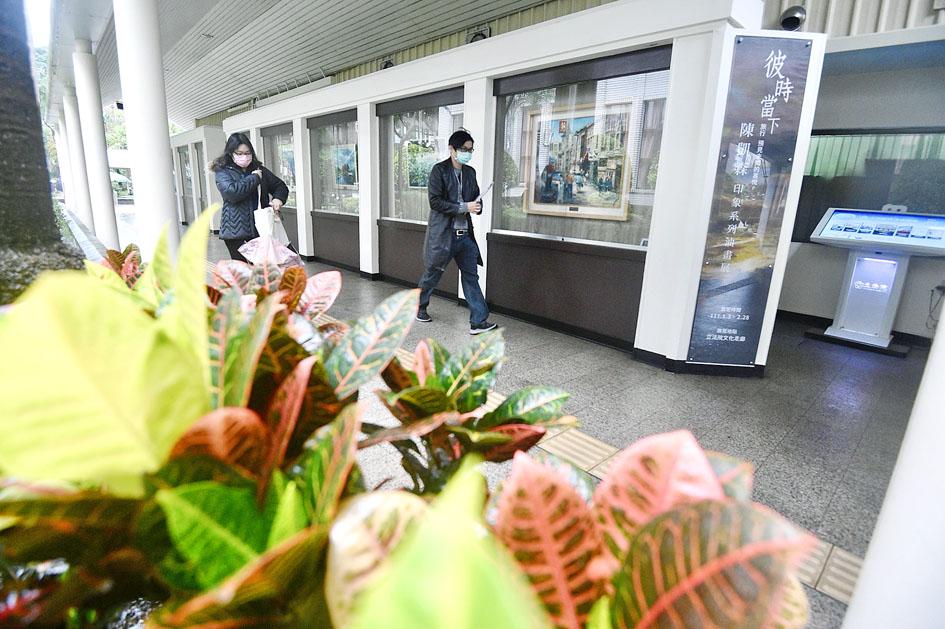Exhibitions have been hosted in the Legislative Yuan Gallery and the Cultural Corridor since 2000, bringing an artistic atmosphere to the conflict-prone image of the country’s legislature.
Most legislators traverse the Cultural Corridor, next to the Legislative Yuan chamber, as they walk from their offices in the Research Building and into the legislature for meetings.
Watercolor, ink and oil paintings, along with lithographic prints and calligraphy, are on permanent display along the corridor, a public space where visitors can appreciate the work.

Photo: George Tsorng, Taipei Times
However, there is also the little-known Legislative Yuan Gallery, which is not open to the public.
Located in the administration building, the gallery displays sculptures, ceramics and industrial designs.
Art has been displayed in the gallery for more than 20 years, spanning three legislative speakers — Wang Jin-pyng (王金平), Su Jia-chyuan (蘇嘉全) and You Si-kun (游錫堃) — a practice that has remained during Taiwan’s changing political landscape.
Exhibitions organized every two months with the National Taiwan Museum comprise 10 traditional pieces and 20 three-dimensional artworks, staff said.
These exclusive exhibitions have strict selection criteria, one being that the artists must have held individual or joint exhibitions, and received an awards at a competition, the staff said.
Additionally, an artist can be exhibited in the Legislative Yuan once within an eight-year period, the staff added.
National Taiwan Museum staff also mentioned that they avoid exhibiting work from well-known artists in the hope that the exhibitions serve as a creative space for artists who are making a name for themselves.
Some works are not considered to be suitable considering the backgrounds or tastes of some legislators, a person familiar with the selection process said.
Artworks featuring nudes, weapons and religious imagery are considered too sensitive for display, while abstract paintings and modern art are avoided out of concerns over fanning controversy, the person said.

US climber Alex Honnold is to attempt to scale Taipei 101 without a rope and harness in a live Netflix special on Jan. 24, the streaming platform announced on Wednesday. Accounting for the time difference, the two-hour broadcast of Honnold’s climb, called Skyscraper Live, is to air on Jan. 23 in the US, Netflix said in a statement. Honnold, 40, was the first person ever to free solo climb the 900m El Capitan rock formation in Yosemite National Park — a feat that was recorded and later made into the 2018 documentary film Free Solo. Netflix previewed Skyscraper Live in October, after videos

NUMBERS IMBALANCE: More than 4 million Taiwanese have visited China this year, while only about half a million Chinese have visited here Beijing has yet to respond to Taiwan’s requests for negotiation over matters related to the recovery of cross-strait tourism, the Tourism Administration said yesterday. Taiwan’s tourism authority issued the statement after Chinese-language daily the China Times reported yesterday that the government’s policy of banning group tours to China does not stop Taiwanese from visiting the country. As of October, more than 4.2 million had traveled to China this year, exceeding last year. Beijing estimated the number of Taiwanese tourists in China could reach 4.5 million this year. By contrast, only 500,000 Chinese tourists are expected in Taiwan, the report said. The report

Temperatures are forecast to drop steadily as a continental cold air mass moves across Taiwan, with some areas also likely to see heavy rainfall, the Central Weather Administration (CWA) said. From today through early tomorrow, a cold air mass would keep temperatures low across central and northern Taiwan, and the eastern half of Taiwan proper, with isolated brief showers forecast along Keelung’s north coast, Taipei and New Taipei City’s mountainous areas and eastern Taiwan, it said. Lows of 11°C to 15°C are forecast in central and northern Taiwan, Yilan County, and the outlying Kinmen and Lienchiang (Matsu) counties, and 14°C to 17°C

STEERING FAILURE: The first boat of its class is experiencing teething issues as it readies for acceptance by the navy, according to a recent story about rudder failure The Hai Kun (海鯤), the nation’s first locally built submarine, allegedly suffered a total failure of stern hydraulic systems during the second round of sea acceptance trials on June 26, and sailors were forced to manually operate the X-rudder to turn the submarine and return to port, news Web site Mirror Daily reported yesterday. The report said that tugboats following the Hai Kun assisted the submarine in avoiding collisions with other ships due to the X-rudder malfunctioning. At the time of the report, the submarine had completed its trials and was scheduled to begin diving and surfacing tests in shallow areas. The X-rudder,